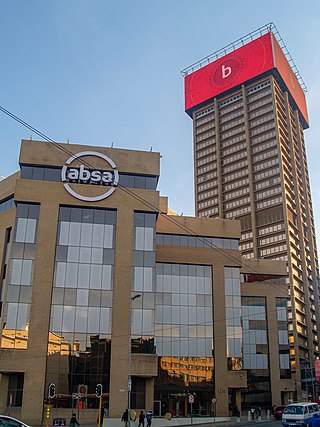
The Afrikaner Broederbond (AB) or simply the Broederbond was an exclusively Afrikaner Calvinist and male secret society in South Africa dedicated to the advancement of the Afrikaner people. It was founded by H. J. Klopper, H. W. van der Merwe, D. H. C. du Plessis and the Rev. Jozua Naudé in 1918 as Jong Zuid Afrika until 1920, when it was renamed the Broederbond. Its influence within South African political and social life came to a climax with the 1948-1994 rule of the white supremacist National Party and its policy of apartheid, which was largely developed and implemented by Broederbond members. Between 1948 and 1994, many prominent figures of Afrikaner political, cultural, and religious life, including every leader of the South African government, were members of the Afrikaner Broederbond.

Bank of ChinaLimited, abbreviated as BOCHK, is a subsidiary of the Bank of China. Bank of China is the second-largest commercial banking group in Hong Kong in terms of assets and customer deposits, with more than 190 branches across Hong Kong as of the end of 2019. It is also one of the three commercial banks licensed by the Hong Kong Monetary Authority to issue banknotes for the Hong Kong dollar.
Barclays Bank has operated as a retail and commercial bank in Canada from 1929 to 1956, from 1979 to 1996, and most recently from 2010.

Standard Bank Group Limited is a major South African bank and financial services group. It is Africa's biggest lender by assets. The company's corporate headquarters, Standard Bank Centre, is situated in Simmonds Street, Johannesburg.

Absa Group Limited, commonly known simply as Absa and formerly the Amalgamated Banks of South Africa (ABSA) until 2005 and Barclays Africa Group Limited until 2018, is a multinational banking and financial services conglomerate based in Johannesburg, South Africa and listed on the Johannesburg Stock Exchange. It offers personal and business banking, credit cards, corporate and investment banking, wealth and investment management and bank assurances.
Commonwealth banknote-issuing institutions also British Empire Paper Currency Issuers comprises a list of public, private, state-owned banks and other government bodies and Currency Boards who issued legal tender: banknotes.

First National Bank is one of South Africa's "big four" banks. It is a division of FirstRand, a large financial services conglomerate, which trades on the Johannesburg Securities Exchange (JSE), under the symbol: FSR. FNB is also listed on the Botswana Stock Exchange under the symbol FNBB and is a constituent of the BSE Domestic Company Index.

The Royal Bank of Scotland plc is a major retail and commercial bank in Scotland. It is one of the retail banking subsidiaries of NatWest Group, together with NatWest and Ulster Bank. The Royal Bank of Scotland has around 700 branches, mainly in Scotland, though there are branches in many larger towns and cities throughout England and Wales. The bank is completely separate from the fellow Edinburgh-based bank, the Bank of Scotland, which pre-dates the Royal Bank by 32 years. The Royal Bank of Scotland was established to provide a bank with strong Hanoverian and Whig ties.
South West Africa had banknotes issued at various times between 1916 and 1959 while under South African administration. The issues of 1916-18 are denominated in South West African marks. The later issues are denominated in South West African pounds.

A bank is a financial institution that accepts deposits from the public and creates a demand deposit while simultaneously making loans. Lending activities can be directly performed by the bank or indirectly through capital markets.

Absa Bank Uganda Limited, formerly known as Barclays Bank of Uganda Limited, is a commercial bank in Uganda. It is licensed by the Bank of Uganda, the country's central bank and national banking regulator. The bank is a subsidiary of Absa Group Limited, a financial services conglomerate, based in South Africa, with banking subsidiaries in 12 African countries and representative offices in two other African countries. Absa Bank Group, whose shares trade on the JSE Limited, was reported to have total assets in excess of US$91 billion, as of October 2019.

African Bank Limited, is a retail bank in South Africa, that offers financial products and services. The Bank is licensed as a "locally controlled bank" by the South African Reserve Bank (SARB). Headquartered in Midrand, South Africa, the bank has a countrywide branch distribution network in addition to a full digital channel offering; as well as sales, collections and customer service Contact Centres.

Absa Bank Kenya Plc, formerly Barclays Bank Kenya Limited, is a commercial bank in Kenya and a subsidiary of South Africa-based Absa Group Limited. It is licensed by the Central Bank of Kenya, the central bank and national banking regulator.
Alewyn Burger is a South African banker and former chief operating officer of Standard Bank. He has a PhD in mathematics from the University of South Africa and attended Harvard Business School's six-week Advanced Management Program (1991).

Absa Bank Mozambique, formerly known as Barclays Bank Mozambique, is a commercial bank in Mozambique. It is licensed by the Bank of Mozambique, the central bank and national banking regulator.

Absa Bank Botswana Limited, formerly known as Barclays Bank of Botswana Limited, is a commercial bank in Botswana, licensed by the Bank of Botswana, the country's central bank and national banking regulator.

Absa Bank Mauritius Limited (ABML), formerly known as Barclays Bank Mauritius Limited, is a commercial bank in Mauritius, licensed by the Bank of Mauritius, the country's central bank and national banking regulator.

Absa Bank Seychelles Limited, formerly known as Barclays Bank Seychelles Limited, is a commercial bank in Seychelles. It is licensed by the Central Bank of Seychelles, the central bank and national banking regulator.

Absa Bank Limited, formerly known as the Amalgamated Banks of South Africa, is a commercial bank in South Africa and the flagship bank of Absa Group. It is licensed by the Reserve Bank of South Africa, the central bank and national banking regulator.










